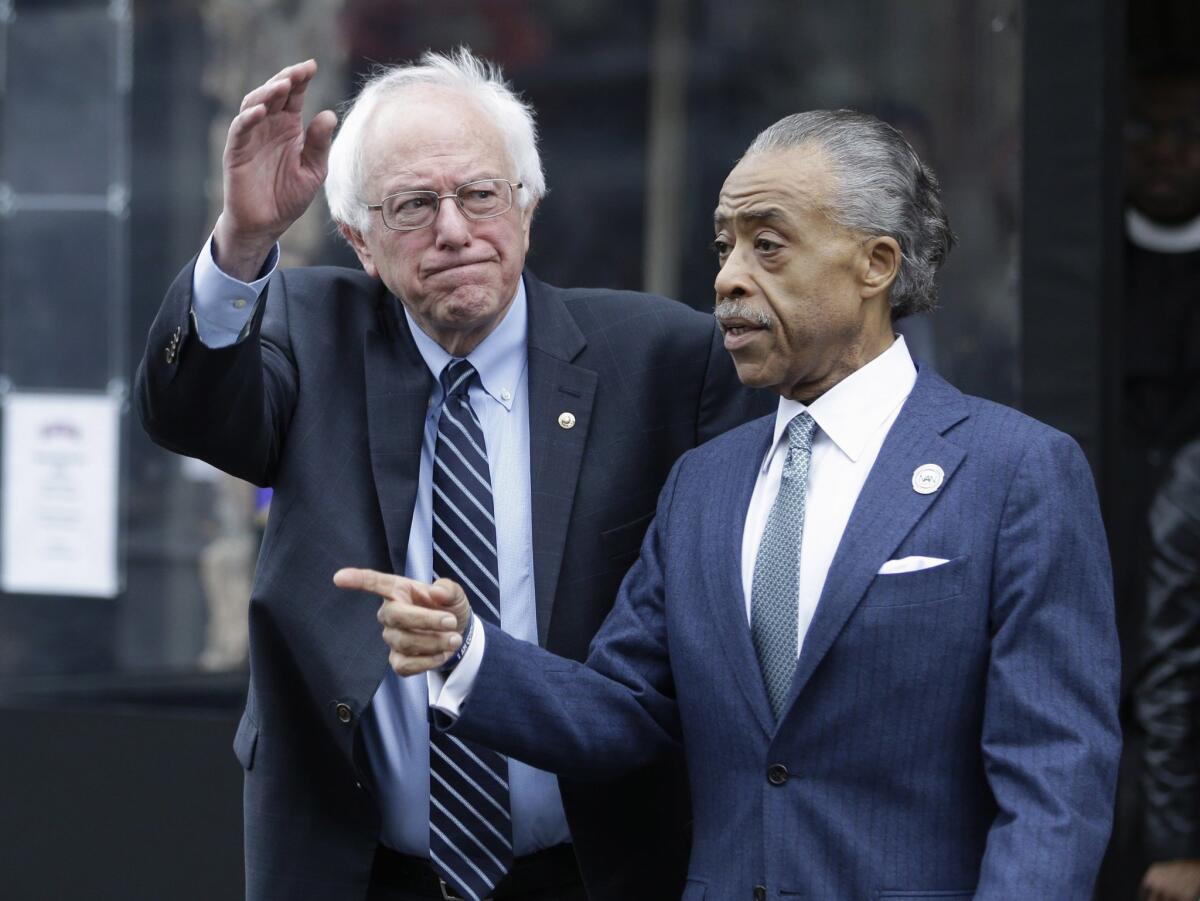Black votes matter in Democratic presidential race as campaigns shift to more diverse states

Democratic presidential candidate Sen. Bernie Sanders of Vermont waves to media and supporters after a breakfast meeting with the Rev. Al Sharpton at Sylvia’s Restaurant in New York’s Harlem.
- Share via
Reporting from Manchester, N.H. — Hillary Clinton’s allies in the black community moved aggressively Wednesday to shore up her support with minority voters following her crushing defeat in New Hampshire, as Sen. Bernie Sanders worked to win over the black and Latino voters who will now be crucial to the outcome of the Democratic nominating contest.
Sanders lost little time moving from his victory rally in New Hampshire to a new, more diverse arena. The Vermont senator headed for Harlem for breakfast with Rev. Al Sharpton, the well-known black leader and commentator. Soon social media was ablaze with photos of the two eating at Sylvia’s, a well known New York soul food restaurant.
From there, Sanders headed for ABC’s “The View,” where he shared his thoughts about police brutality with the program’s 2 million viewers.
By mid-afternoon, Clinton surrogates in the African American community were firing back, charging Sanders with inflating his civil rights credentials.
“Hillary Clinton has been a true friend to the African American community for the last 40 years,” Rep. Hakeem Jeffries (D-N.Y.), said on a media conference call arranged by Clinton’s campaign. “During that period of time, Bernie Sanders has been largely missing in action.”
TRAIL GUIDE: All the latest news on the 2016 presidential campaign >>
As her supporters threw barbs, Clinton herself lay low, taking stock of the damage caused by her 22-point loss in New Hampshire and looking ahead toward a debate with Sanders on Thursday night.
The next few weeks will pose a critical test for both campaigns as the competition shifts from the all-white electorates of Iowa and New Hampshire to racially diverse states whose electorates more nearly reflect the broader population. Nevada’s Democratic caucuses are on Feb. 20; South Carolina’s Democratic primary is Feb. 27.
In both states, Sanders is up against a rival who has deep ties in black and Latino communities and who has also been steadily lining up key endorsements from well-liked minority lawmakers and civil rights leaders for months.
The Clinton campaign had long viewed Nevada and South Carolina as bulwarks that would protect it against any unexpected surge by Sanders.
In Nevada, the former secretary of State has several advantages, including long-standing ties to Latino leaders and the fact that the state’s caucuses are closed to independents, cutting Sanders off from a bloc of voters who helped him greatly in Iowa and New Hampshire.
Despite those facts, Sanders suddenly finds himself positioned to pose a significant threat.
On Wednesday afternoon, Sanders’ campaign announced that he had raised a record $5.2 million since the New Hampshire polls closed the night before. His campaign has been spending significantly more money on advertising in Nevada than Clinton is, and the infusion of new cash may allow him to continue to out-gun her on the air.
David Damore, a political science professor at the University of Nevada, Las Vegas, said Clinton has effectively used her relationships and history with Nevadans to reach out to minority voters.
“Her campaign has laid the groundwork,” he said. Yet Nevada, with its transient population, can be fickle and is already very different than it was when Clinton campaigned there in 2008, Damore noted.
“We have so much migration in and out of the state,” he said. “The electorate is always changing here.”
South Carolina has a more stable electorate, but there, too, Clinton faces a significant fight.
Over the last 10 days, Sanders has enlisted 1,000 new volunteers in the state, bringing the total number to 5,000, according to Chris Covert, the campaign’s South Carolina director. They’ve knocked on 300,000 doors.
The state’s most influential black lawmaker, Rep. James E. Clyburn, told MSNBC Wednesday that Sanders, a candidate who was virtually unknown in the state only a couple of months ago, has built an impressive campaign organization in that state.
“It’s very effective,” said Clyburn, who has not yet made an endorsement. “They have a pretty potent ground operation going on in South Carolina. And I’m pleased to see that.”
Clinton’s campaign is counting on help from many of the state’s Democratic elected officials. Wednesday, they released an endorsement from J. Todd Rutherford, the Democratic minority leader in the South Carolina House who was an early supporter of then-Sen. Barack Obama in 2008.
Even as they fight in those two states, the campaigns are both looking ahead to additional arenas. Clinton’s headquarters announced, for example, that Chelsea Clinton was headed to Flint, Mich., where her mother had appeared on Sunday.
Clinton has taken a prominent role in speaking out for the residents of that largely African American city, whose residents have been poisoned by lead contaminating their drinking water. The state holds its primary on March 8, but her advocacy for its residents may also help Clinton with black voters elsewhere.
Allies of Clinton also announced that they were launching a $25-million get-out-the-vote effort aimed at blacks and Latinos. The new organization, Every Citizen Counts, will be able to raise unlimited amounts of cash, and the head of Clinton’s biggest super PAC will be its advisor.
The organizers said their effort was aimed at turning out voters to the polls and defending voting rights. The group will not be engaged in the primary campaign, yet the effort is a reminder to black and Latino voters that Clinton is in their corner.
Yet Sanders can now boast his own support from prominent minority figures. He recently earned the endorsement of Benjamin Jealous, the former chief executive of the NAACP, who has been campaigning in South Carolina.
“Now that [Sanders] is seen as a top-tier contender, we’ll find that candidate Clinton has hit her high watermark,” Jealous predicted in a radio interview. “She will begin to lose support. How fast and how much remains to be seen.”
Ta-Nehisi Coates, the prominent black writer and activist also said Wednesday that Sanders will be getting his vote, though not any kind of endorsement.
And Sharpton told reporters that he is weighing giving Sanders his backing.
“My concern is, as the first black family in the White House moves out at the end of the year, our concerns don’t move out with them,” Sharpton told MSNBC. He added that he would not make a decision until after a meeting of civil rights leaders next week that both candidates plan to attend.
For more on Campaign 2016, follow @EvanHalper and @ChrisMegerian
MORE POLITICS NEWS
New Hampshire primary results >>
Editorial: Trump wins N.H. while the GOP establishment churns
With New Hampshire result, Trump is a serious contender, and Kasich is back in the race












